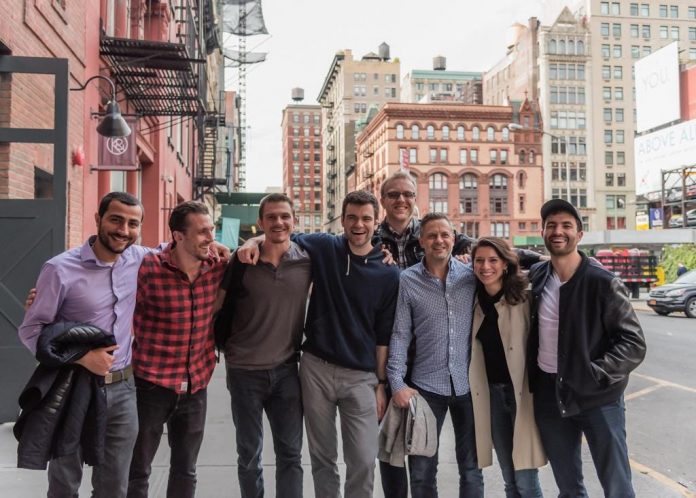Early team members of the Stacks project in 2017 outside their Soho office in NYC. Muneeb Ali is the first on the left.
Trust Machines
It’s summer 2017. Muneeb Ali, a PhD candidate in computer science at Princeton, is finishing his thesis, detailing his experience of building Blockstack—a decentralized blockchain-based internet, enabling users to own their data. Inspired by the founding father of modern computers and fellow Princeton graduate, Alan Turing, and the work of Bitcoin’s anonymous creator Satoshi Nakamoto, Ali was exploring applications beyond financial use cases that could be built atop the largest decentralized payments network.
Fast forward to the present day. Dr. Ali has just raised $150 million to build New York-based Trust Machines, a company he co-founded with Princeton computer science professor Dr. JP Singh, which seeks to unleash what they consider “the true potential of bitcoin” by developing decentralized finance applications, DAOs and NFTs on the rebranded Blockstack, now called Stacks, a smart contracts network linked to bitcoin.
Investors in the round include Breyer Capital, Union Square Ventures, Digital Currency Group, GoldenTree, Hivemind, among others. The valuation was not disclosed. At stake is the potential for bitcoin to thrive in Web3.
“We believe that bitcoin can be more than a store of value; it can also be the settlement layer and platform for Web 3,” said Jim Breyer, founder and CEO of Breyer Capital and early Facebook investor. “We’re excited to support Trust Machines and their mission to help bitcoin reach its potential.”
The participation of high-profile investors like Breyer is a vote of confidence to bitcoin’s growth prospects. Despite its success, bitcoin’s ecosystem has seen slower development than other so-called Layer-1 chains, such as Ethereum and Solana, as of late. Unlike these networks and their respective assets, bitcoin has gained mainstream support as a “store of value” due to its scarcity. But this narrative is presently being challenged by bitcoin’s increasing correlation with risky assets like stocks.
Trust Machines aims to convert bitcoin’s trillion-dollar value into more productive capital and grow an economy of bitcoin applications, according to Ali. “Bitcoin as a programmable Layer 1 is so underappreciated,” he laments.
With raised capital, Trust Machines plans to aggressively hire bitcoin core developers to build products that would enable bitcoin investors to participate in the budding sector of decentralized finance, though the lion’s share of its value is currently locked in Ethereum. Think yield-bearing opportunities for bitcoin holders, social applications, DAOs, bitcoin-native NFT experiences and swaps, to name a few.
“Over the last four or five years, we’ve been building the infrastructure (Stacks) to make it possible to build those applications,” says Ali. “And now that the infrastructure has matured, we’re building these applications.”
Ali after his PhD thesis defense at Princeton University in 2017 standing next to Brian Kernighan, an early developer of the C programming language and UNIX operating system.
Trust Machines
Ali had first heard of bitcoin in 2011 from Princeton professor Arvind Narayanan, who later wrote one of the most popular college textbooks on the subject and served on Ali’s thesis committee, but had not read Satoshi’s white paper for another two years. “One thing that really fascinated me,” he recounts, reflecting on Stacks’ beginnings, was “What else can we do with this technology?”
To answer that question, Hiro, a New-York based company he cofounded to build developer tools for Stacks, has raised a combined $75 million from investors including Union Square Ventures, Y Combinator, Winklevoss Capital, and even Harvard Management Co., the firm managing the university’s $41.9 billion endowment, which bought a cumulative $11.5 million in Stacks tokens in 2019. Last month, the Stacks mainnet celebrated its one-year anniversary with over 2,500 smart contract deployments and 50,000 wallet downloads.
In many ways, bitcoin smart contracts could be considered the Holy Grail of crypto. Platforms like Stacks or RSK, another network supporting bitcoin smart contracts developed by Argentina-based IOVLavs, show that the developer ecosystem around bitcoin can innovate and enable support for Web 3.
Hiro, which Ali has until now headed, will from now on be led by Alex Miller, currently Hiro’s Chief Operating Officer, though Ali will stay on as chairman of the board. Diwaker Gupta, currently VP of Technology, will take on the role of Hiro’s Chief Technology Officer.
Credit: Source link






















 Bitcoin
Bitcoin  Ethereum
Ethereum  Tether
Tether  Solana
Solana  USDC
USDC  Lido Staked Ether
Lido Staked Ether  XRP
XRP  Dogecoin
Dogecoin  Toncoin
Toncoin  Cardano
Cardano  Shiba Inu
Shiba Inu  Avalanche
Avalanche  TRON
TRON  Wrapped Bitcoin
Wrapped Bitcoin  Bitcoin Cash
Bitcoin Cash  Polkadot
Polkadot  Chainlink
Chainlink  NEAR Protocol
NEAR Protocol  Polygon
Polygon  Internet Computer
Internet Computer  Litecoin
Litecoin  Uniswap
Uniswap  LEO Token
LEO Token  Dai
Dai  First Digital USD
First Digital USD  Ethereum Classic
Ethereum Classic  Aptos
Aptos  Hedera
Hedera  Stacks
Stacks  Cronos
Cronos  Mantle
Mantle  Stellar
Stellar  Filecoin
Filecoin  Cosmos Hub
Cosmos Hub  Renzo Restaked ETH
Renzo Restaked ETH  XT.com
XT.com  OKB
OKB  Render
Render  Pepe
Pepe  Immutable
Immutable  Arbitrum
Arbitrum  Bittensor
Bittensor  dogwifhat
dogwifhat  Wrapped eETH
Wrapped eETH  Optimism
Optimism  Maker
Maker  The Graph
The Graph 
